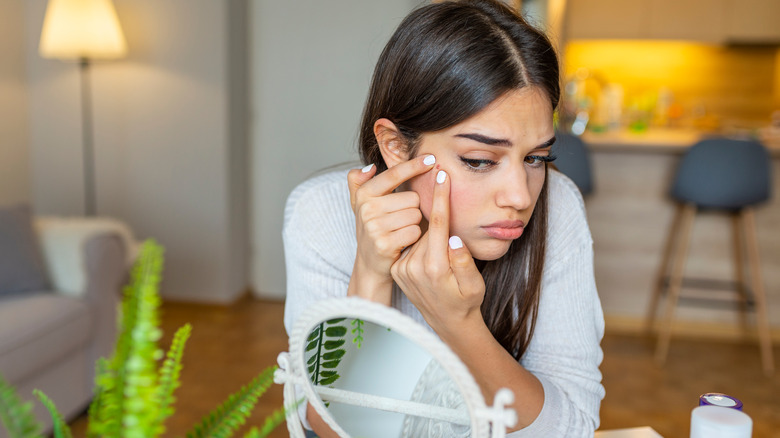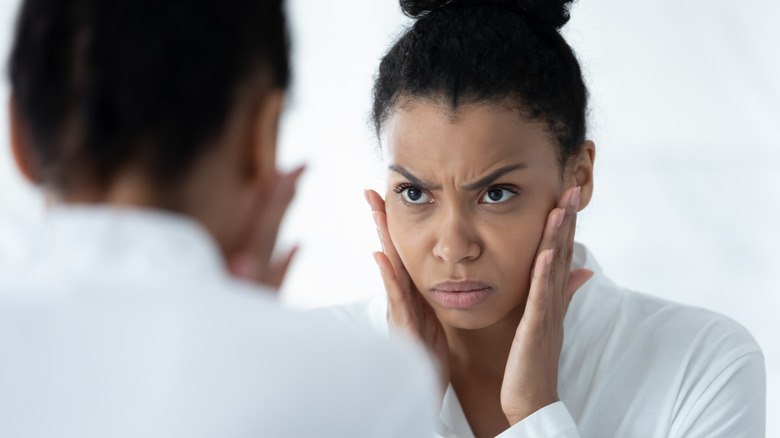People Who Frequently Face-Pick Might Have Acne Excoriée. Here's How To Deal
In general, pimple-popping is gross; it often involves puss and bleeding. Whether you've had a parent, friend, or even a dermatologist scold you for it, we've all been told it's bad for our skin. It is not an effective way to treat acne. And yet, with all of those negative aspects aside, it can be so satisfying. If you don't feel this way, many people do. Just look up pimple-popping on TikTok (or don't, if you want to avoid some gnarly content). This page of acne-extracting videos has over 2.6 billion views.
Clinical psychologist Sanam Hafeez tells Vice that popping pimples gives people a sense of achievement followed by an addictive rush of dopamine, a chemical that produces feelings of happiness. Hafeez explains this phenomenon saying, " there's a combination of brain activity here. First, the 'oh no there's a pimple' anxiety followed by the physical relief when it's self-treated and the sense of calm and pleasure when it's gone." We often dismiss acne picking as a mild "bad habit," but for many people, it can lead to prolonged compulsive behavior known as "Excoriation Disorder."
What acne exoriée looks like
This skin-picking disorder can also be referred to as "acne exoriée," according to Women's Health. The International OCD Foundation reports that this disorder may affect up to 1 in 20 people and is most common in women. Women's Health mentions that it often coincides with "depression, anxiety, OCD, body dysmorphia, or emotional triggers." However, before you go self-diagnosing, it is important to note that acne exoriéee is very different from the occasional acne picking.
The owner of Savanna Boda Aesthetics, Savanna Boda, tells Women's Health, "it becomes excoriée when you cannot stop, and it becomes an addiction ... spending hours in the mirror picking at your skin and every imperfection." The effects of exoriée are far more harmful than those of sporadic pimple popping. The International OCD Foundation explains that the former can lead to scarring, infections, emotional and physical pain, intensified insecurity, and even impede one's day-to-day responsibilities.
What you can do if you think you might have acne excoriée
If Boda's description of exorciée with Women's Health sounded a bit too relatable or you have experienced any of IOCDF's list of symptoms, you could be struggling with this disorder. If this is the case, we recommend you consult a psychiatrist or a medical doctor to discuss treatment. Clinical psychologist Jenny Yip tells PopSugar that "the evidence-based treatment for skin picking involves a combination of exposure and response prevention therapy (ERP) and habit reversal training (HRT)." Boda also recommends, "remove anything that poses as a trigger, such as a close-up mirror or at-home extraction tools."
Beyond healing psychologically, you may also be concerned with healing physically. You may want to consult your dermatologist on how to treat present acne as well as heal and prevent acne scarring. Licensed aesthetician Alex Hernandez tells PopSugar "corrective treatments, such as a chemical peel or microneedling, will be needed to improve hyperpigmentation and texture left behind from picking."


